Relationship between Moral Foundations and Political Orientation in Australia
VerifiedAdded on 2023/06/16
|16
|4042
|475
AI Summary
This study explores the relationship between moral foundations and political orientation in Australia. The study uses the Moral Foundation Questionnaire and Political Orientation Question to collect data from 227 respondents. The results show that care and fairness were the two most voted moral foundations in all political orientations. The study aims to inform election candidates on the strategies they ought to use to gain more votes.
Contribute Materials
Your contribution can guide someone’s learning journey. Share your
documents today.
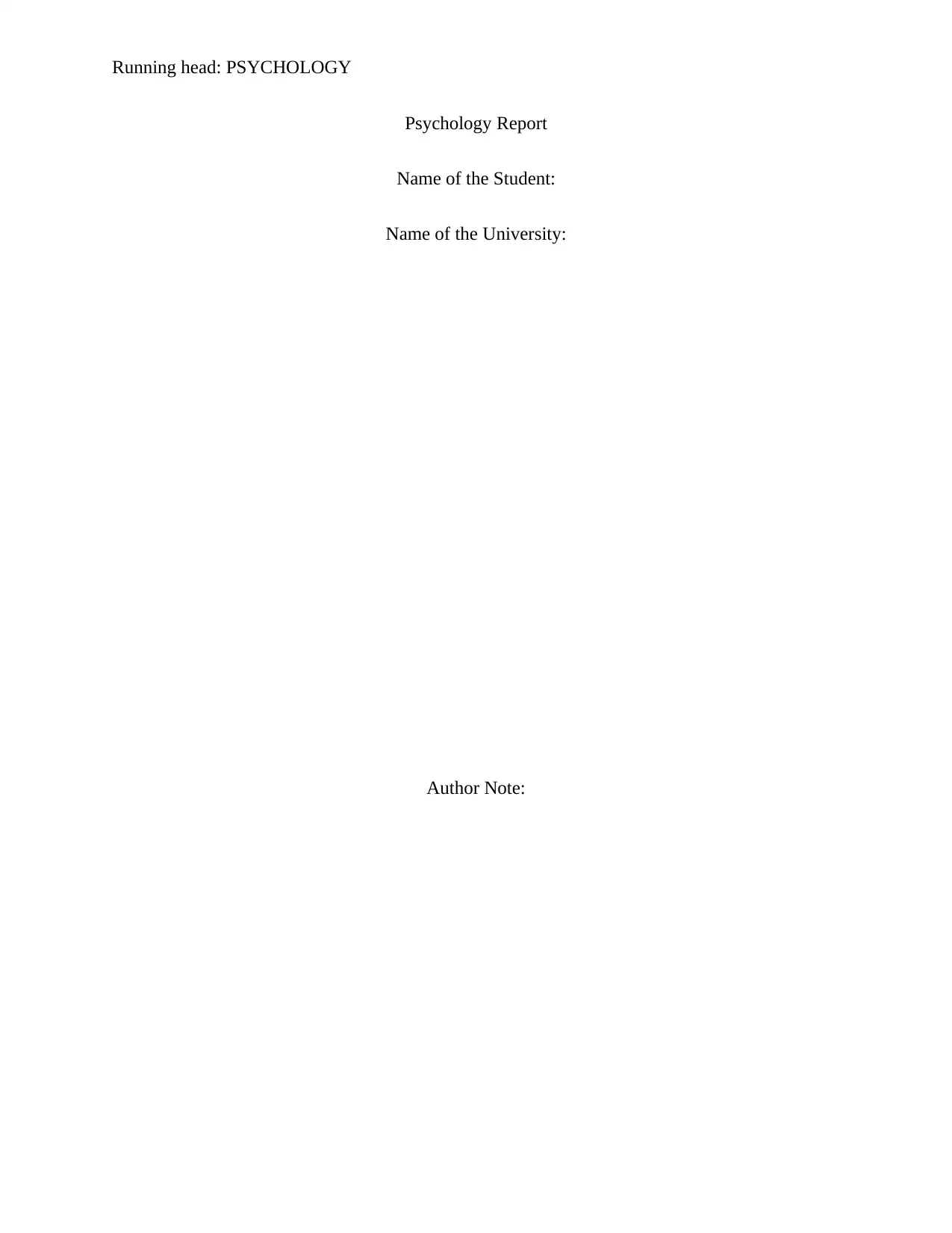
Running head: PSYCHOLOGY
Psychology Report
Name of the Student:
Name of the University:
Author Note:
Psychology Report
Name of the Student:
Name of the University:
Author Note:
Secure Best Marks with AI Grader
Need help grading? Try our AI Grader for instant feedback on your assignments.
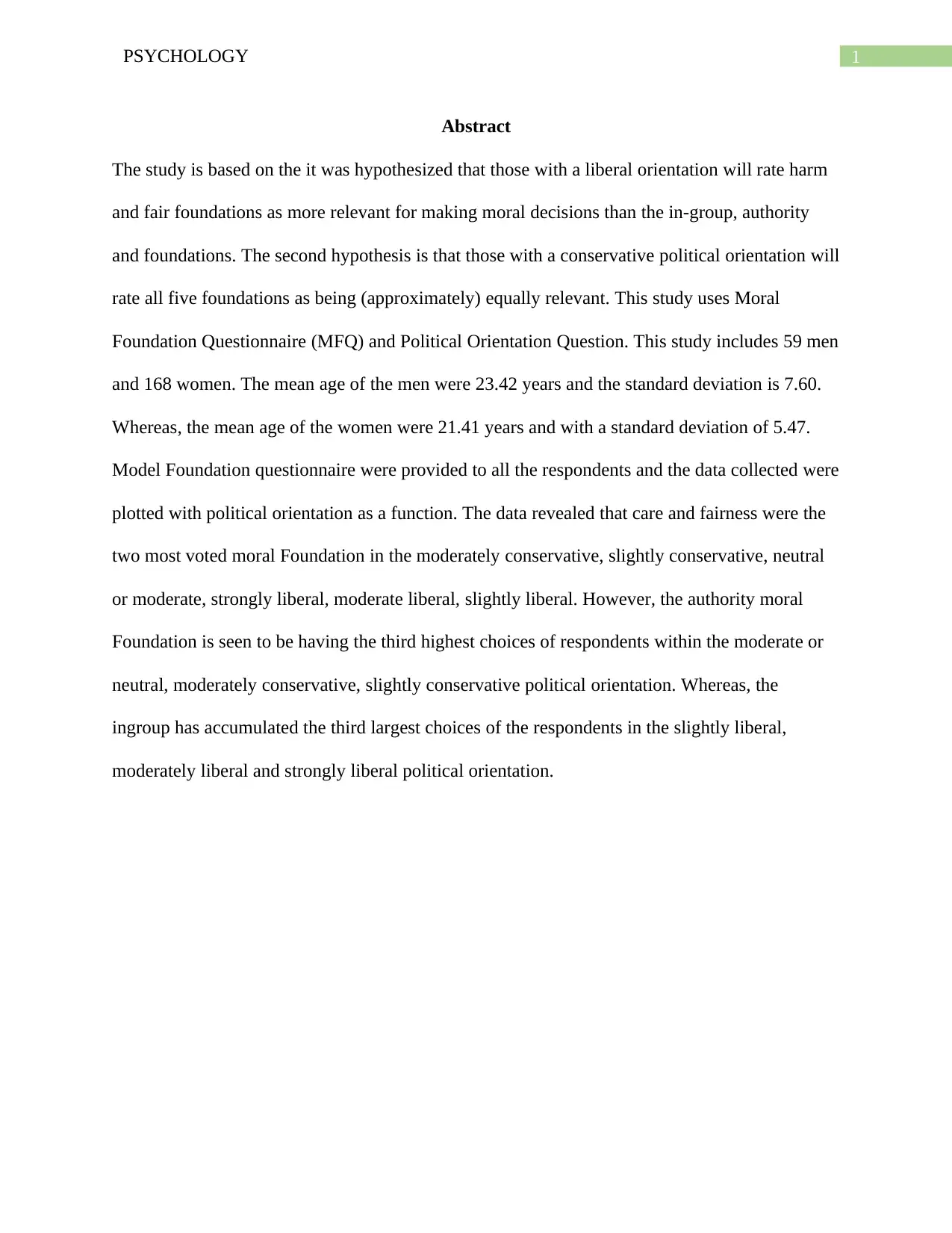
1PSYCHOLOGY
Abstract
The study is based on the it was hypothesized that those with a liberal orientation will rate harm
and fair foundations as more relevant for making moral decisions than the in-group, authority
and foundations. The second hypothesis is that those with a conservative political orientation will
rate all five foundations as being (approximately) equally relevant. This study uses Moral
Foundation Questionnaire (MFQ) and Political Orientation Question. This study includes 59 men
and 168 women. The mean age of the men were 23.42 years and the standard deviation is 7.60.
Whereas, the mean age of the women were 21.41 years and with a standard deviation of 5.47.
Model Foundation questionnaire were provided to all the respondents and the data collected were
plotted with political orientation as a function. The data revealed that care and fairness were the
two most voted moral Foundation in the moderately conservative, slightly conservative, neutral
or moderate, strongly liberal, moderate liberal, slightly liberal. However, the authority moral
Foundation is seen to be having the third highest choices of respondents within the moderate or
neutral, moderately conservative, slightly conservative political orientation. Whereas, the
ingroup has accumulated the third largest choices of the respondents in the slightly liberal,
moderately liberal and strongly liberal political orientation.
Abstract
The study is based on the it was hypothesized that those with a liberal orientation will rate harm
and fair foundations as more relevant for making moral decisions than the in-group, authority
and foundations. The second hypothesis is that those with a conservative political orientation will
rate all five foundations as being (approximately) equally relevant. This study uses Moral
Foundation Questionnaire (MFQ) and Political Orientation Question. This study includes 59 men
and 168 women. The mean age of the men were 23.42 years and the standard deviation is 7.60.
Whereas, the mean age of the women were 21.41 years and with a standard deviation of 5.47.
Model Foundation questionnaire were provided to all the respondents and the data collected were
plotted with political orientation as a function. The data revealed that care and fairness were the
two most voted moral Foundation in the moderately conservative, slightly conservative, neutral
or moderate, strongly liberal, moderate liberal, slightly liberal. However, the authority moral
Foundation is seen to be having the third highest choices of respondents within the moderate or
neutral, moderately conservative, slightly conservative political orientation. Whereas, the
ingroup has accumulated the third largest choices of the respondents in the slightly liberal,
moderately liberal and strongly liberal political orientation.
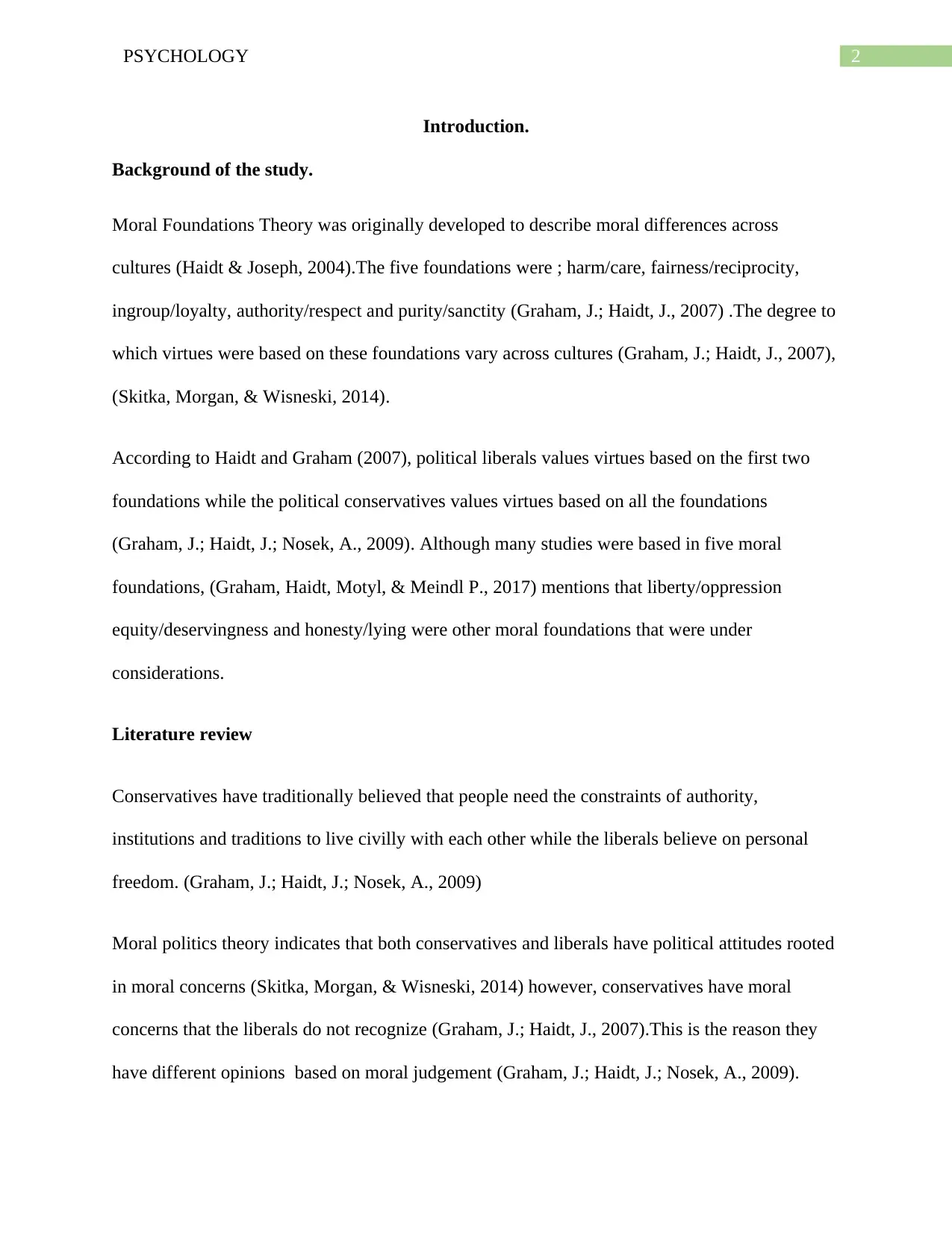
2PSYCHOLOGY
Introduction.
Background of the study.
Moral Foundations Theory was originally developed to describe moral differences across
cultures (Haidt & Joseph, 2004).The five foundations were ; harm/care, fairness/reciprocity,
ingroup/loyalty, authority/respect and purity/sanctity (Graham, J.; Haidt, J., 2007) .The degree to
which virtues were based on these foundations vary across cultures (Graham, J.; Haidt, J., 2007),
(Skitka, Morgan, & Wisneski, 2014).
According to Haidt and Graham (2007), political liberals values virtues based on the first two
foundations while the political conservatives values virtues based on all the foundations
(Graham, J.; Haidt, J.; Nosek, A., 2009). Although many studies were based in five moral
foundations, (Graham, Haidt, Motyl, & Meindl P., 2017) mentions that liberty/oppression
equity/deservingness and honesty/lying were other moral foundations that were under
considerations.
Literature review
Conservatives have traditionally believed that people need the constraints of authority,
institutions and traditions to live civilly with each other while the liberals believe on personal
freedom. (Graham, J.; Haidt, J.; Nosek, A., 2009)
Moral politics theory indicates that both conservatives and liberals have political attitudes rooted
in moral concerns (Skitka, Morgan, & Wisneski, 2014) however, conservatives have moral
concerns that the liberals do not recognize (Graham, J.; Haidt, J., 2007).This is the reason they
have different opinions based on moral judgement (Graham, J.; Haidt, J.; Nosek, A., 2009).
Introduction.
Background of the study.
Moral Foundations Theory was originally developed to describe moral differences across
cultures (Haidt & Joseph, 2004).The five foundations were ; harm/care, fairness/reciprocity,
ingroup/loyalty, authority/respect and purity/sanctity (Graham, J.; Haidt, J., 2007) .The degree to
which virtues were based on these foundations vary across cultures (Graham, J.; Haidt, J., 2007),
(Skitka, Morgan, & Wisneski, 2014).
According to Haidt and Graham (2007), political liberals values virtues based on the first two
foundations while the political conservatives values virtues based on all the foundations
(Graham, J.; Haidt, J.; Nosek, A., 2009). Although many studies were based in five moral
foundations, (Graham, Haidt, Motyl, & Meindl P., 2017) mentions that liberty/oppression
equity/deservingness and honesty/lying were other moral foundations that were under
considerations.
Literature review
Conservatives have traditionally believed that people need the constraints of authority,
institutions and traditions to live civilly with each other while the liberals believe on personal
freedom. (Graham, J.; Haidt, J.; Nosek, A., 2009)
Moral politics theory indicates that both conservatives and liberals have political attitudes rooted
in moral concerns (Skitka, Morgan, & Wisneski, 2014) however, conservatives have moral
concerns that the liberals do not recognize (Graham, J.; Haidt, J., 2007).This is the reason they
have different opinions based on moral judgement (Graham, J.; Haidt, J.; Nosek, A., 2009).
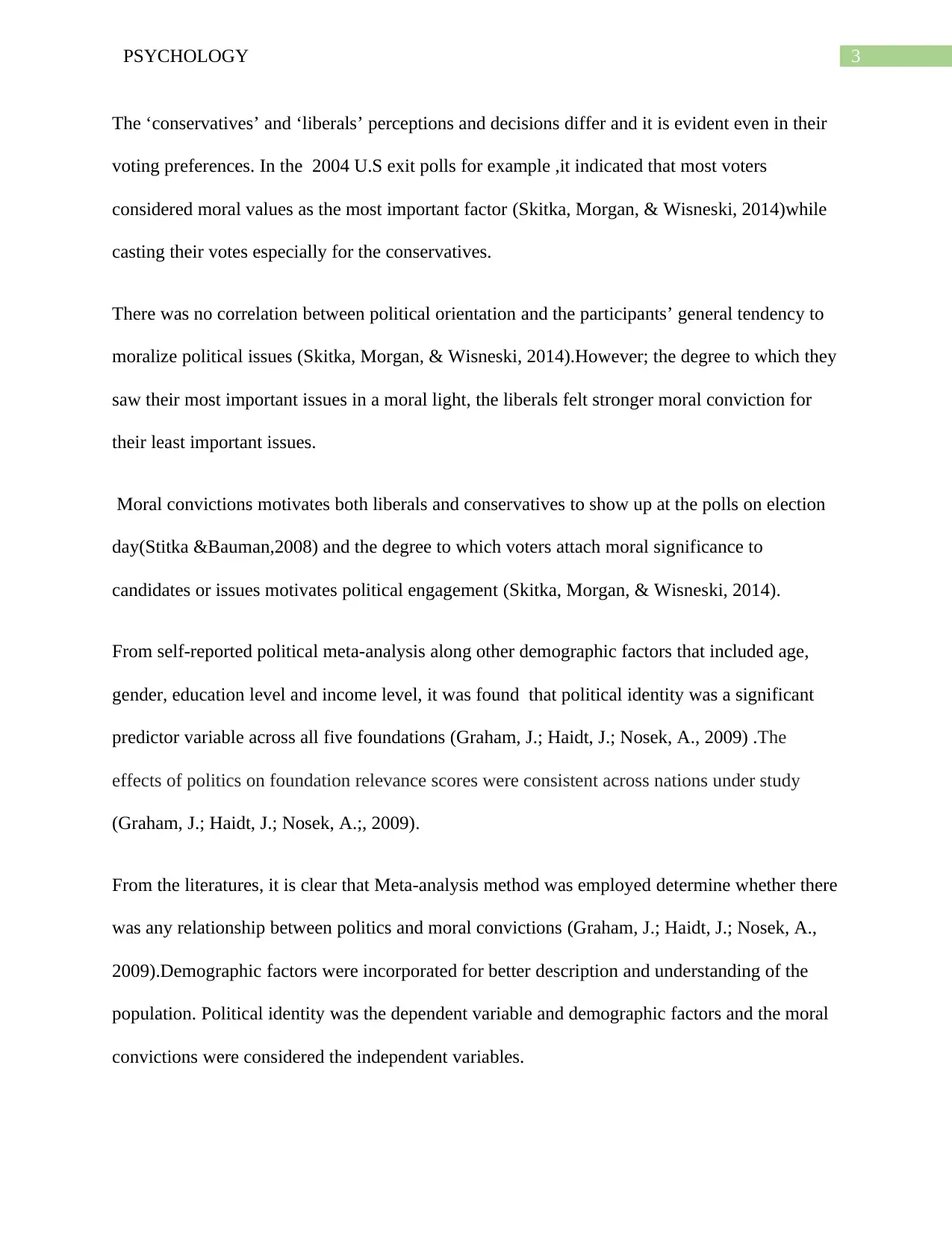
3PSYCHOLOGY
The ‘conservatives’ and ‘liberals’ perceptions and decisions differ and it is evident even in their
voting preferences. In the 2004 U.S exit polls for example ,it indicated that most voters
considered moral values as the most important factor (Skitka, Morgan, & Wisneski, 2014)while
casting their votes especially for the conservatives.
There was no correlation between political orientation and the participants’ general tendency to
moralize political issues (Skitka, Morgan, & Wisneski, 2014).However; the degree to which they
saw their most important issues in a moral light, the liberals felt stronger moral conviction for
their least important issues.
Moral convictions motivates both liberals and conservatives to show up at the polls on election
day(Stitka &Bauman,2008) and the degree to which voters attach moral significance to
candidates or issues motivates political engagement (Skitka, Morgan, & Wisneski, 2014).
From self-reported political meta-analysis along other demographic factors that included age,
gender, education level and income level, it was found that political identity was a significant
predictor variable across all five foundations (Graham, J.; Haidt, J.; Nosek, A., 2009) .The
effects of politics on foundation relevance scores were consistent across nations under study
(Graham, J.; Haidt, J.; Nosek, A.;, 2009).
From the literatures, it is clear that Meta-analysis method was employed determine whether there
was any relationship between politics and moral convictions (Graham, J.; Haidt, J.; Nosek, A.,
2009).Demographic factors were incorporated for better description and understanding of the
population. Political identity was the dependent variable and demographic factors and the moral
convictions were considered the independent variables.
The ‘conservatives’ and ‘liberals’ perceptions and decisions differ and it is evident even in their
voting preferences. In the 2004 U.S exit polls for example ,it indicated that most voters
considered moral values as the most important factor (Skitka, Morgan, & Wisneski, 2014)while
casting their votes especially for the conservatives.
There was no correlation between political orientation and the participants’ general tendency to
moralize political issues (Skitka, Morgan, & Wisneski, 2014).However; the degree to which they
saw their most important issues in a moral light, the liberals felt stronger moral conviction for
their least important issues.
Moral convictions motivates both liberals and conservatives to show up at the polls on election
day(Stitka &Bauman,2008) and the degree to which voters attach moral significance to
candidates or issues motivates political engagement (Skitka, Morgan, & Wisneski, 2014).
From self-reported political meta-analysis along other demographic factors that included age,
gender, education level and income level, it was found that political identity was a significant
predictor variable across all five foundations (Graham, J.; Haidt, J.; Nosek, A., 2009) .The
effects of politics on foundation relevance scores were consistent across nations under study
(Graham, J.; Haidt, J.; Nosek, A.;, 2009).
From the literatures, it is clear that Meta-analysis method was employed determine whether there
was any relationship between politics and moral convictions (Graham, J.; Haidt, J.; Nosek, A.,
2009).Demographic factors were incorporated for better description and understanding of the
population. Political identity was the dependent variable and demographic factors and the moral
convictions were considered the independent variables.
Secure Best Marks with AI Grader
Need help grading? Try our AI Grader for instant feedback on your assignments.
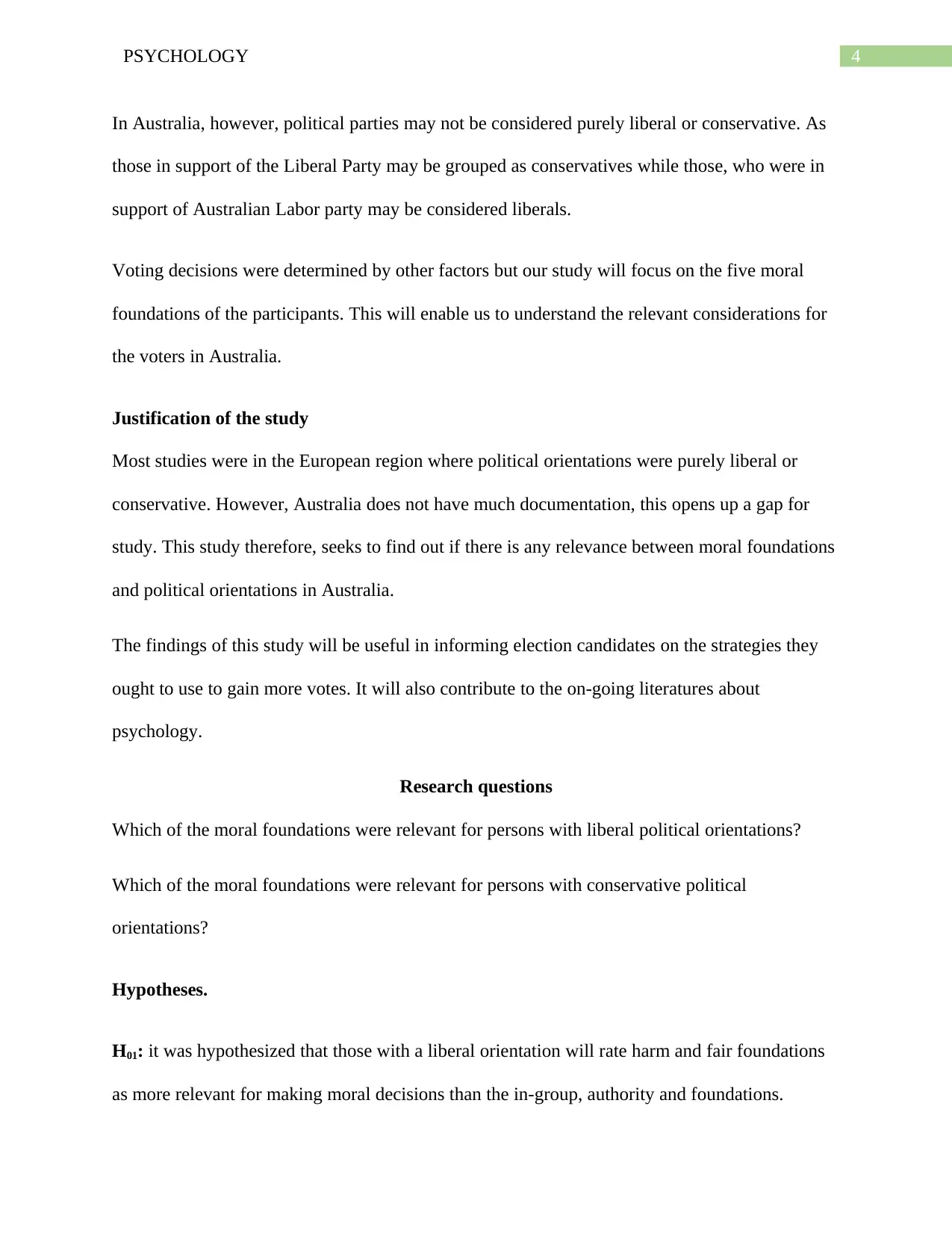
4PSYCHOLOGY
In Australia, however, political parties may not be considered purely liberal or conservative. As
those in support of the Liberal Party may be grouped as conservatives while those, who were in
support of Australian Labor party may be considered liberals.
Voting decisions were determined by other factors but our study will focus on the five moral
foundations of the participants. This will enable us to understand the relevant considerations for
the voters in Australia.
Justification of the study
Most studies were in the European region where political orientations were purely liberal or
conservative. However, Australia does not have much documentation, this opens up a gap for
study. This study therefore, seeks to find out if there is any relevance between moral foundations
and political orientations in Australia.
The findings of this study will be useful in informing election candidates on the strategies they
ought to use to gain more votes. It will also contribute to the on-going literatures about
psychology.
Research questions
Which of the moral foundations were relevant for persons with liberal political orientations?
Which of the moral foundations were relevant for persons with conservative political
orientations?
Hypotheses.
H01: it was hypothesized that those with a liberal orientation will rate harm and fair foundations
as more relevant for making moral decisions than the in-group, authority and foundations.
In Australia, however, political parties may not be considered purely liberal or conservative. As
those in support of the Liberal Party may be grouped as conservatives while those, who were in
support of Australian Labor party may be considered liberals.
Voting decisions were determined by other factors but our study will focus on the five moral
foundations of the participants. This will enable us to understand the relevant considerations for
the voters in Australia.
Justification of the study
Most studies were in the European region where political orientations were purely liberal or
conservative. However, Australia does not have much documentation, this opens up a gap for
study. This study therefore, seeks to find out if there is any relevance between moral foundations
and political orientations in Australia.
The findings of this study will be useful in informing election candidates on the strategies they
ought to use to gain more votes. It will also contribute to the on-going literatures about
psychology.
Research questions
Which of the moral foundations were relevant for persons with liberal political orientations?
Which of the moral foundations were relevant for persons with conservative political
orientations?
Hypotheses.
H01: it was hypothesized that those with a liberal orientation will rate harm and fair foundations
as more relevant for making moral decisions than the in-group, authority and foundations.
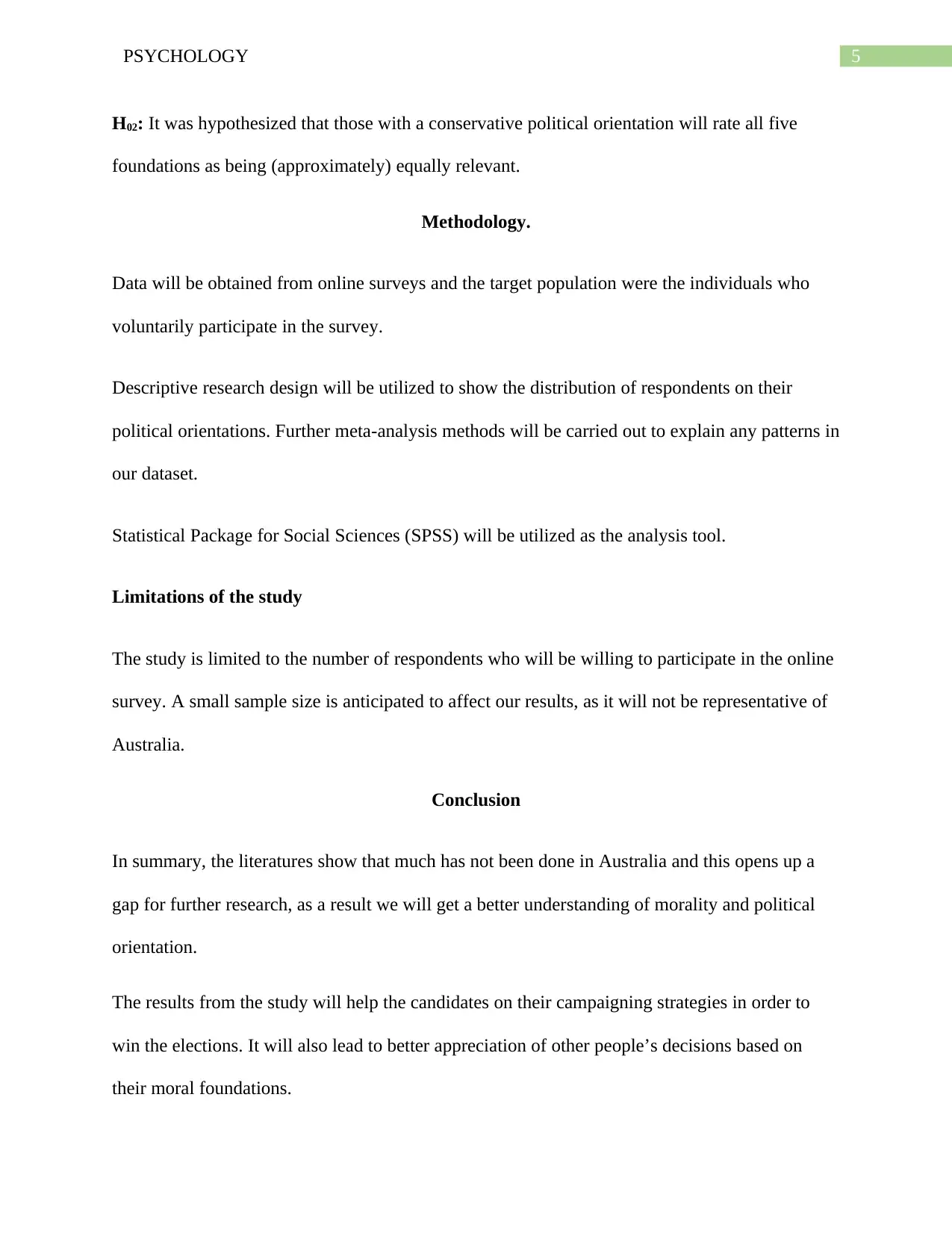
5PSYCHOLOGY
H02: It was hypothesized that those with a conservative political orientation will rate all five
foundations as being (approximately) equally relevant.
Methodology.
Data will be obtained from online surveys and the target population were the individuals who
voluntarily participate in the survey.
Descriptive research design will be utilized to show the distribution of respondents on their
political orientations. Further meta-analysis methods will be carried out to explain any patterns in
our dataset.
Statistical Package for Social Sciences (SPSS) will be utilized as the analysis tool.
Limitations of the study
The study is limited to the number of respondents who will be willing to participate in the online
survey. A small sample size is anticipated to affect our results, as it will not be representative of
Australia.
Conclusion
In summary, the literatures show that much has not been done in Australia and this opens up a
gap for further research, as a result we will get a better understanding of morality and political
orientation.
The results from the study will help the candidates on their campaigning strategies in order to
win the elections. It will also lead to better appreciation of other people’s decisions based on
their moral foundations.
H02: It was hypothesized that those with a conservative political orientation will rate all five
foundations as being (approximately) equally relevant.
Methodology.
Data will be obtained from online surveys and the target population were the individuals who
voluntarily participate in the survey.
Descriptive research design will be utilized to show the distribution of respondents on their
political orientations. Further meta-analysis methods will be carried out to explain any patterns in
our dataset.
Statistical Package for Social Sciences (SPSS) will be utilized as the analysis tool.
Limitations of the study
The study is limited to the number of respondents who will be willing to participate in the online
survey. A small sample size is anticipated to affect our results, as it will not be representative of
Australia.
Conclusion
In summary, the literatures show that much has not been done in Australia and this opens up a
gap for further research, as a result we will get a better understanding of morality and political
orientation.
The results from the study will help the candidates on their campaigning strategies in order to
win the elections. It will also lead to better appreciation of other people’s decisions based on
their moral foundations.
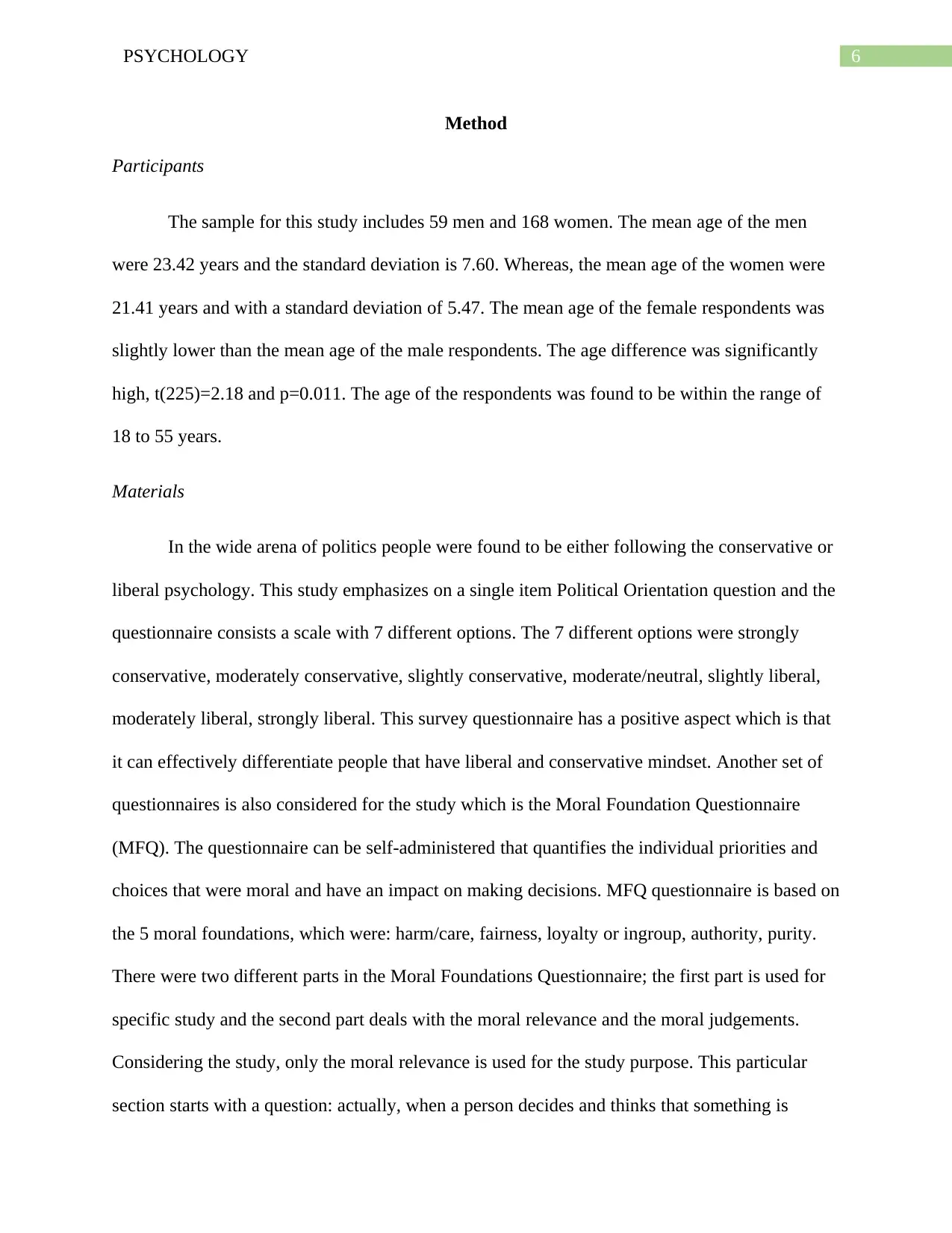
6PSYCHOLOGY
Method
Participants
The sample for this study includes 59 men and 168 women. The mean age of the men
were 23.42 years and the standard deviation is 7.60. Whereas, the mean age of the women were
21.41 years and with a standard deviation of 5.47. The mean age of the female respondents was
slightly lower than the mean age of the male respondents. The age difference was significantly
high, t(225)=2.18 and p=0.011. The age of the respondents was found to be within the range of
18 to 55 years.
Materials
In the wide arena of politics people were found to be either following the conservative or
liberal psychology. This study emphasizes on a single item Political Orientation question and the
questionnaire consists a scale with 7 different options. The 7 different options were strongly
conservative, moderately conservative, slightly conservative, moderate/neutral, slightly liberal,
moderately liberal, strongly liberal. This survey questionnaire has a positive aspect which is that
it can effectively differentiate people that have liberal and conservative mindset. Another set of
questionnaires is also considered for the study which is the Moral Foundation Questionnaire
(MFQ). The questionnaire can be self-administered that quantifies the individual priorities and
choices that were moral and have an impact on making decisions. MFQ questionnaire is based on
the 5 moral foundations, which were: harm/care, fairness, loyalty or ingroup, authority, purity.
There were two different parts in the Moral Foundations Questionnaire; the first part is used for
specific study and the second part deals with the moral relevance and the moral judgements.
Considering the study, only the moral relevance is used for the study purpose. This particular
section starts with a question: actually, when a person decides and thinks that something is
Method
Participants
The sample for this study includes 59 men and 168 women. The mean age of the men
were 23.42 years and the standard deviation is 7.60. Whereas, the mean age of the women were
21.41 years and with a standard deviation of 5.47. The mean age of the female respondents was
slightly lower than the mean age of the male respondents. The age difference was significantly
high, t(225)=2.18 and p=0.011. The age of the respondents was found to be within the range of
18 to 55 years.
Materials
In the wide arena of politics people were found to be either following the conservative or
liberal psychology. This study emphasizes on a single item Political Orientation question and the
questionnaire consists a scale with 7 different options. The 7 different options were strongly
conservative, moderately conservative, slightly conservative, moderate/neutral, slightly liberal,
moderately liberal, strongly liberal. This survey questionnaire has a positive aspect which is that
it can effectively differentiate people that have liberal and conservative mindset. Another set of
questionnaires is also considered for the study which is the Moral Foundation Questionnaire
(MFQ). The questionnaire can be self-administered that quantifies the individual priorities and
choices that were moral and have an impact on making decisions. MFQ questionnaire is based on
the 5 moral foundations, which were: harm/care, fairness, loyalty or ingroup, authority, purity.
There were two different parts in the Moral Foundations Questionnaire; the first part is used for
specific study and the second part deals with the moral relevance and the moral judgements.
Considering the study, only the moral relevance is used for the study purpose. This particular
section starts with a question: actually, when a person decides and thinks that something is
Paraphrase This Document
Need a fresh take? Get an instant paraphrase of this document with our AI Paraphraser
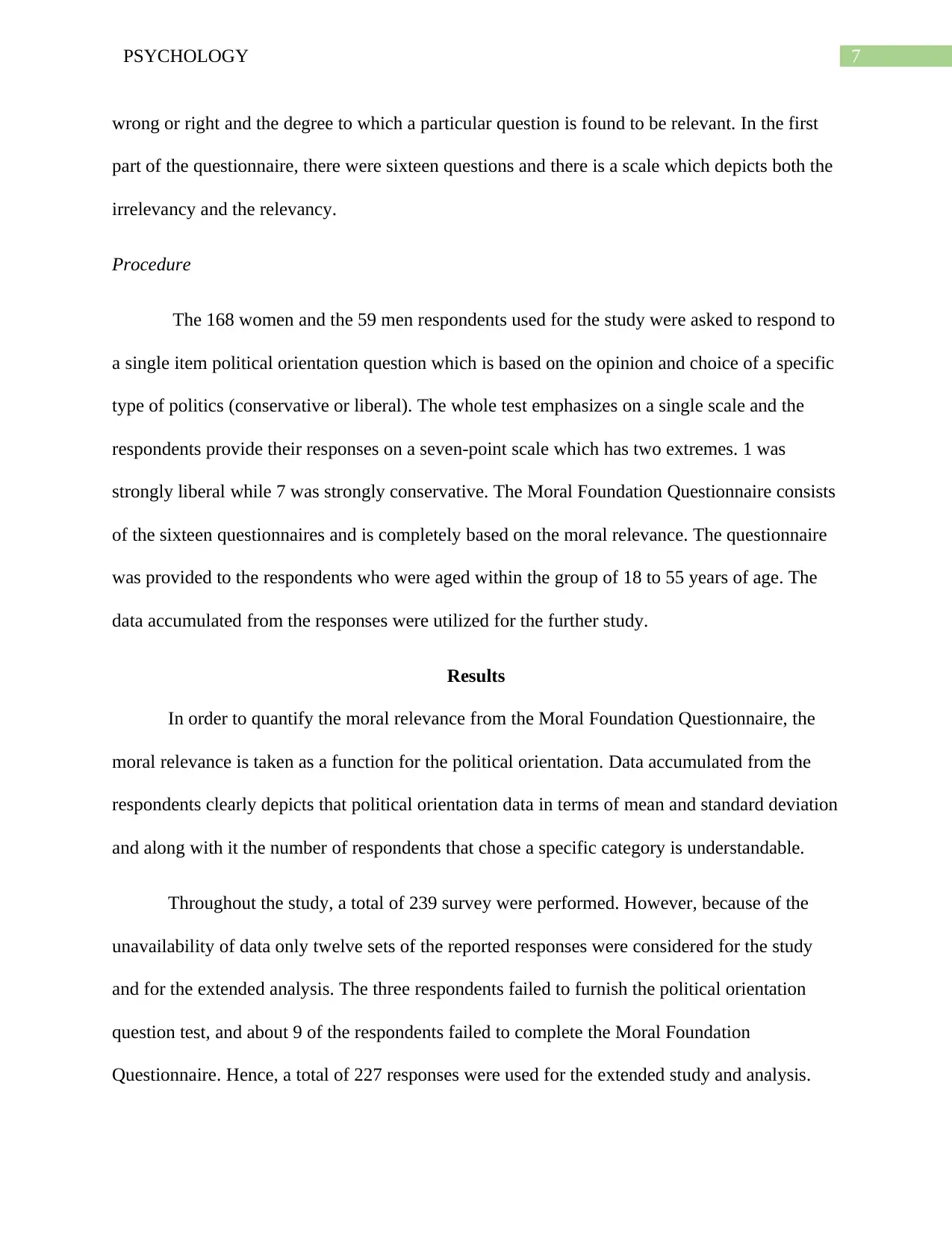
7PSYCHOLOGY
wrong or right and the degree to which a particular question is found to be relevant. In the first
part of the questionnaire, there were sixteen questions and there is a scale which depicts both the
irrelevancy and the relevancy.
Procedure
The 168 women and the 59 men respondents used for the study were asked to respond to
a single item political orientation question which is based on the opinion and choice of a specific
type of politics (conservative or liberal). The whole test emphasizes on a single scale and the
respondents provide their responses on a seven-point scale which has two extremes. 1 was
strongly liberal while 7 was strongly conservative. The Moral Foundation Questionnaire consists
of the sixteen questionnaires and is completely based on the moral relevance. The questionnaire
was provided to the respondents who were aged within the group of 18 to 55 years of age. The
data accumulated from the responses were utilized for the further study.
Results
In order to quantify the moral relevance from the Moral Foundation Questionnaire, the
moral relevance is taken as a function for the political orientation. Data accumulated from the
respondents clearly depicts that political orientation data in terms of mean and standard deviation
and along with it the number of respondents that chose a specific category is understandable.
Throughout the study, a total of 239 survey were performed. However, because of the
unavailability of data only twelve sets of the reported responses were considered for the study
and for the extended analysis. The three respondents failed to furnish the political orientation
question test, and about 9 of the respondents failed to complete the Moral Foundation
Questionnaire. Hence, a total of 227 responses were used for the extended study and analysis.
wrong or right and the degree to which a particular question is found to be relevant. In the first
part of the questionnaire, there were sixteen questions and there is a scale which depicts both the
irrelevancy and the relevancy.
Procedure
The 168 women and the 59 men respondents used for the study were asked to respond to
a single item political orientation question which is based on the opinion and choice of a specific
type of politics (conservative or liberal). The whole test emphasizes on a single scale and the
respondents provide their responses on a seven-point scale which has two extremes. 1 was
strongly liberal while 7 was strongly conservative. The Moral Foundation Questionnaire consists
of the sixteen questionnaires and is completely based on the moral relevance. The questionnaire
was provided to the respondents who were aged within the group of 18 to 55 years of age. The
data accumulated from the responses were utilized for the further study.
Results
In order to quantify the moral relevance from the Moral Foundation Questionnaire, the
moral relevance is taken as a function for the political orientation. Data accumulated from the
respondents clearly depicts that political orientation data in terms of mean and standard deviation
and along with it the number of respondents that chose a specific category is understandable.
Throughout the study, a total of 239 survey were performed. However, because of the
unavailability of data only twelve sets of the reported responses were considered for the study
and for the extended analysis. The three respondents failed to furnish the political orientation
question test, and about 9 of the respondents failed to complete the Moral Foundation
Questionnaire. Hence, a total of 227 responses were used for the extended study and analysis.
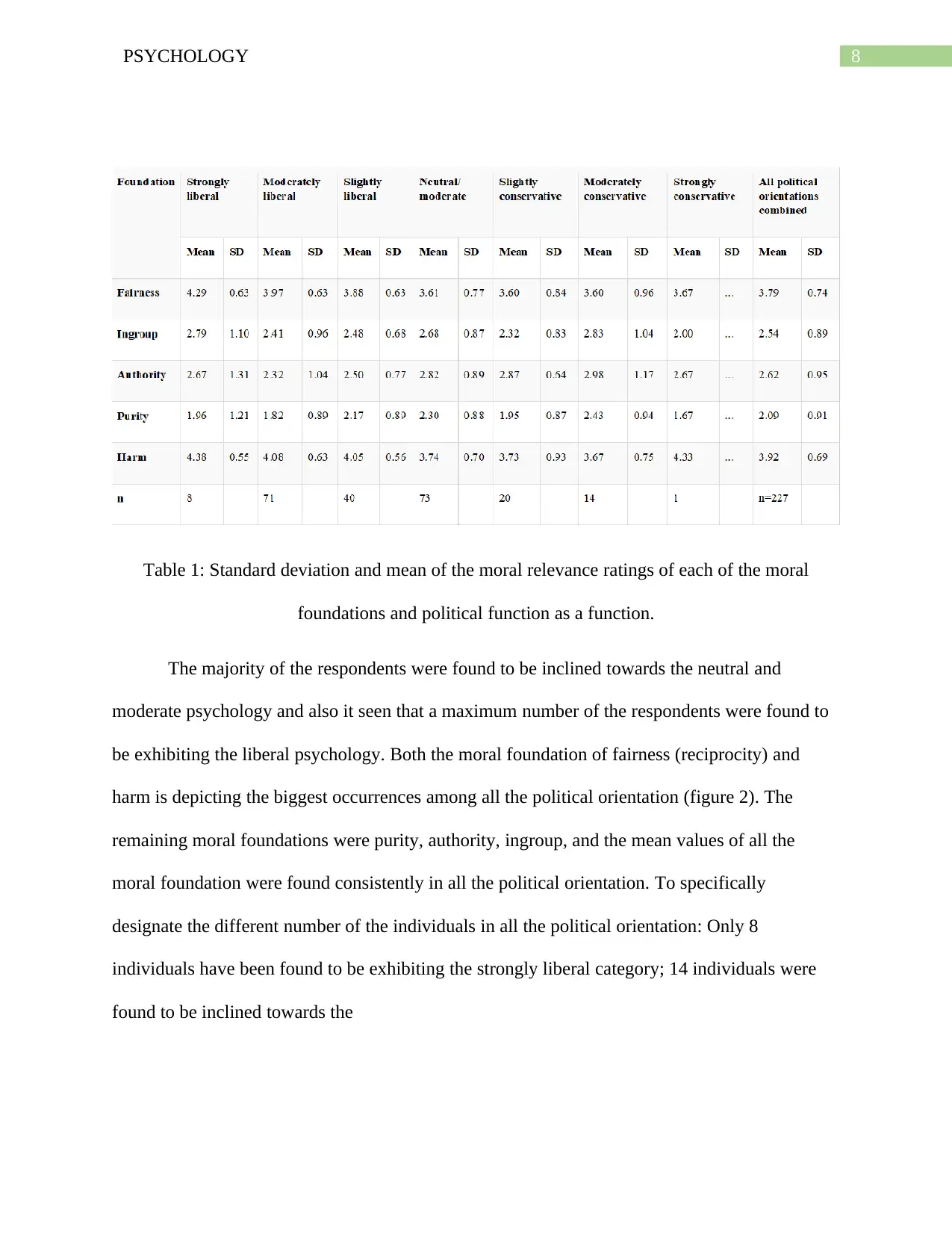
8PSYCHOLOGY
Table 1: Standard deviation and mean of the moral relevance ratings of each of the moral
foundations and political function as a function.
The majority of the respondents were found to be inclined towards the neutral and
moderate psychology and also it seen that a maximum number of the respondents were found to
be exhibiting the liberal psychology. Both the moral foundation of fairness (reciprocity) and
harm is depicting the biggest occurrences among all the political orientation (figure 2). The
remaining moral foundations were purity, authority, ingroup, and the mean values of all the
moral foundation were found consistently in all the political orientation. To specifically
designate the different number of the individuals in all the political orientation: Only 8
individuals have been found to be exhibiting the strongly liberal category; 14 individuals were
found to be inclined towards the
Table 1: Standard deviation and mean of the moral relevance ratings of each of the moral
foundations and political function as a function.
The majority of the respondents were found to be inclined towards the neutral and
moderate psychology and also it seen that a maximum number of the respondents were found to
be exhibiting the liberal psychology. Both the moral foundation of fairness (reciprocity) and
harm is depicting the biggest occurrences among all the political orientation (figure 2). The
remaining moral foundations were purity, authority, ingroup, and the mean values of all the
moral foundation were found consistently in all the political orientation. To specifically
designate the different number of the individuals in all the political orientation: Only 8
individuals have been found to be exhibiting the strongly liberal category; 14 individuals were
found to be inclined towards the
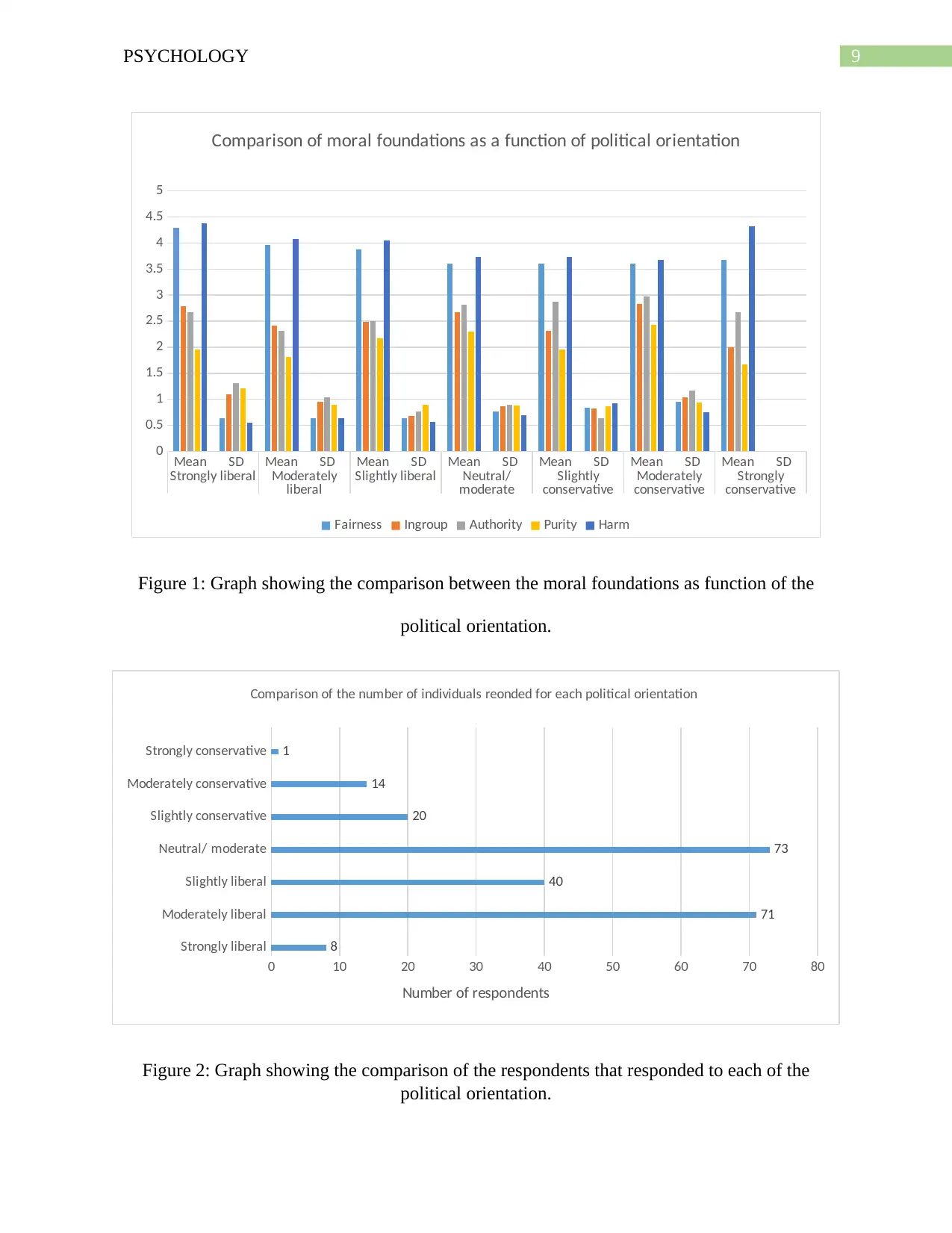
9PSYCHOLOGY
Mean SD Mean SD Mean SD Mean SD Mean SD Mean SD Mean SD
Strongly liberal Moderately
liberal Slightly liberal Neutral/
moderate Slightly
conservative Moderately
conservative Strongly
conservative
0
0.5
1
1.5
2
2.5
3
3.5
4
4.5
5
Comparison of moral foundations as a function of political orientation
Fairness Ingroup Authority Purity Harm
Figure 1: Graph showing the comparison between the moral foundations as function of the
political orientation.
Strongly liberal
Moderately liberal
Slightly liberal
Neutral/ moderate
Slightly conservative
Moderately conservative
Strongly conservative
0 10 20 30 40 50 60 70 80
8
71
40
73
20
14
1
Comparison of the number of individuals reonded for each political orientation
Number of respondents
Figure 2: Graph showing the comparison of the respondents that responded to each of the
political orientation.
Mean SD Mean SD Mean SD Mean SD Mean SD Mean SD Mean SD
Strongly liberal Moderately
liberal Slightly liberal Neutral/
moderate Slightly
conservative Moderately
conservative Strongly
conservative
0
0.5
1
1.5
2
2.5
3
3.5
4
4.5
5
Comparison of moral foundations as a function of political orientation
Fairness Ingroup Authority Purity Harm
Figure 1: Graph showing the comparison between the moral foundations as function of the
political orientation.
Strongly liberal
Moderately liberal
Slightly liberal
Neutral/ moderate
Slightly conservative
Moderately conservative
Strongly conservative
0 10 20 30 40 50 60 70 80
8
71
40
73
20
14
1
Comparison of the number of individuals reonded for each political orientation
Number of respondents
Figure 2: Graph showing the comparison of the respondents that responded to each of the
political orientation.
Secure Best Marks with AI Grader
Need help grading? Try our AI Grader for instant feedback on your assignments.
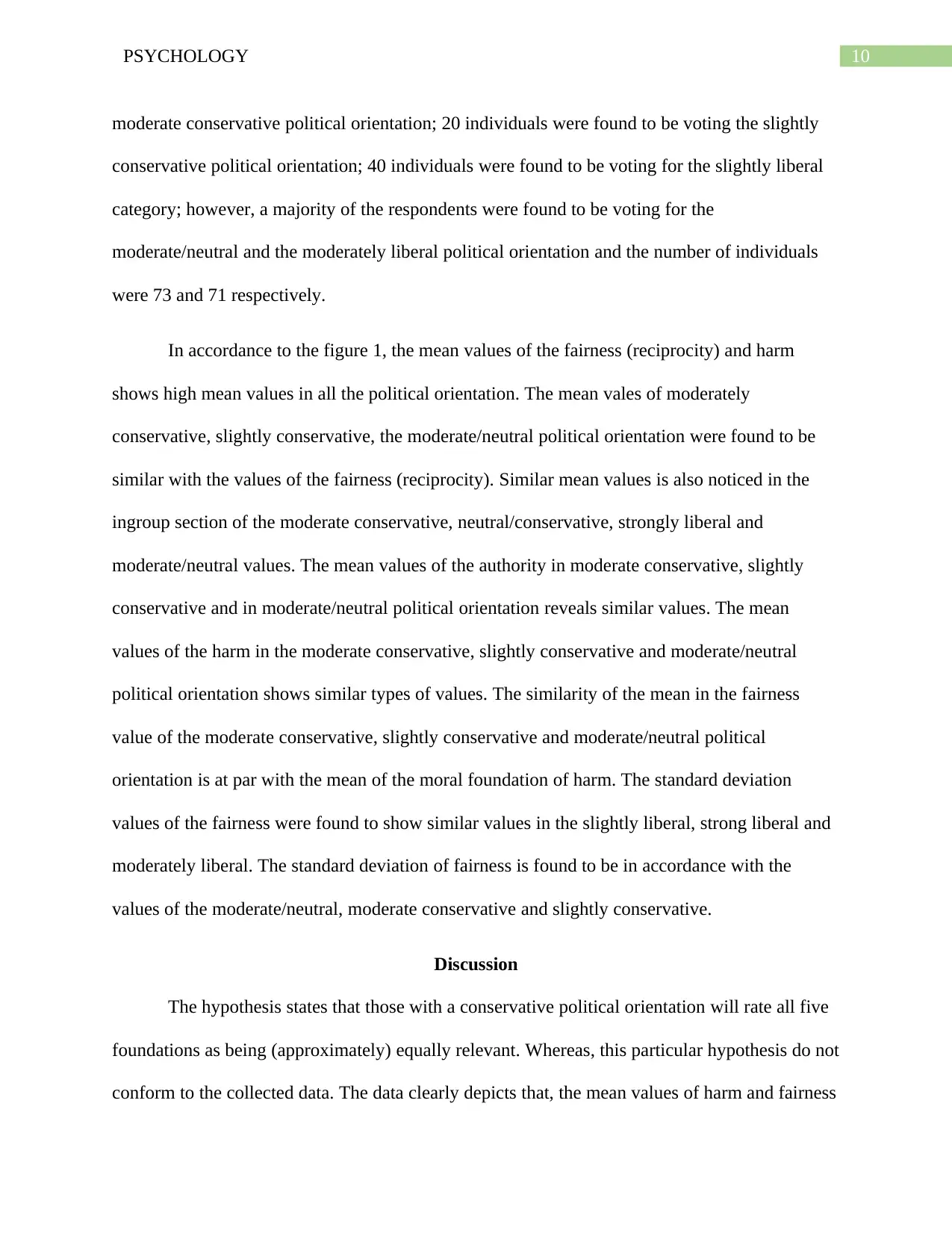
10PSYCHOLOGY
moderate conservative political orientation; 20 individuals were found to be voting the slightly
conservative political orientation; 40 individuals were found to be voting for the slightly liberal
category; however, a majority of the respondents were found to be voting for the
moderate/neutral and the moderately liberal political orientation and the number of individuals
were 73 and 71 respectively.
In accordance to the figure 1, the mean values of the fairness (reciprocity) and harm
shows high mean values in all the political orientation. The mean vales of moderately
conservative, slightly conservative, the moderate/neutral political orientation were found to be
similar with the values of the fairness (reciprocity). Similar mean values is also noticed in the
ingroup section of the moderate conservative, neutral/conservative, strongly liberal and
moderate/neutral values. The mean values of the authority in moderate conservative, slightly
conservative and in moderate/neutral political orientation reveals similar values. The mean
values of the harm in the moderate conservative, slightly conservative and moderate/neutral
political orientation shows similar types of values. The similarity of the mean in the fairness
value of the moderate conservative, slightly conservative and moderate/neutral political
orientation is at par with the mean of the moral foundation of harm. The standard deviation
values of the fairness were found to show similar values in the slightly liberal, strong liberal and
moderately liberal. The standard deviation of fairness is found to be in accordance with the
values of the moderate/neutral, moderate conservative and slightly conservative.
Discussion
The hypothesis states that those with a conservative political orientation will rate all five
foundations as being (approximately) equally relevant. Whereas, this particular hypothesis do not
conform to the collected data. The data clearly depicts that, the mean values of harm and fairness
moderate conservative political orientation; 20 individuals were found to be voting the slightly
conservative political orientation; 40 individuals were found to be voting for the slightly liberal
category; however, a majority of the respondents were found to be voting for the
moderate/neutral and the moderately liberal political orientation and the number of individuals
were 73 and 71 respectively.
In accordance to the figure 1, the mean values of the fairness (reciprocity) and harm
shows high mean values in all the political orientation. The mean vales of moderately
conservative, slightly conservative, the moderate/neutral political orientation were found to be
similar with the values of the fairness (reciprocity). Similar mean values is also noticed in the
ingroup section of the moderate conservative, neutral/conservative, strongly liberal and
moderate/neutral values. The mean values of the authority in moderate conservative, slightly
conservative and in moderate/neutral political orientation reveals similar values. The mean
values of the harm in the moderate conservative, slightly conservative and moderate/neutral
political orientation shows similar types of values. The similarity of the mean in the fairness
value of the moderate conservative, slightly conservative and moderate/neutral political
orientation is at par with the mean of the moral foundation of harm. The standard deviation
values of the fairness were found to show similar values in the slightly liberal, strong liberal and
moderately liberal. The standard deviation of fairness is found to be in accordance with the
values of the moderate/neutral, moderate conservative and slightly conservative.
Discussion
The hypothesis states that those with a conservative political orientation will rate all five
foundations as being (approximately) equally relevant. Whereas, this particular hypothesis do not
conform to the collected data. The data clearly depicts that, the mean values of harm and fairness
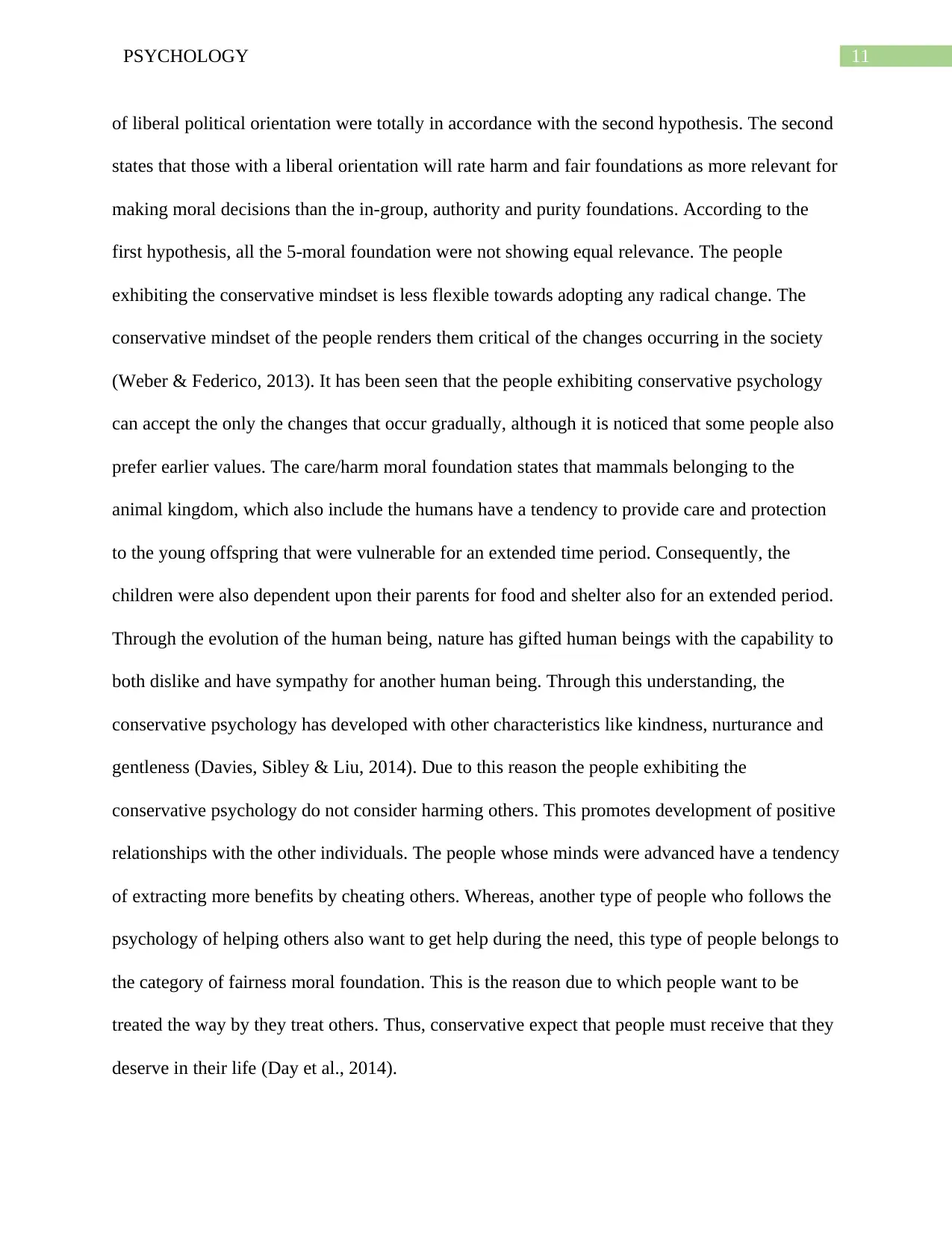
11PSYCHOLOGY
of liberal political orientation were totally in accordance with the second hypothesis. The second
states that those with a liberal orientation will rate harm and fair foundations as more relevant for
making moral decisions than the in-group, authority and purity foundations. According to the
first hypothesis, all the 5-moral foundation were not showing equal relevance. The people
exhibiting the conservative mindset is less flexible towards adopting any radical change. The
conservative mindset of the people renders them critical of the changes occurring in the society
(Weber & Federico, 2013). It has been seen that the people exhibiting conservative psychology
can accept the only the changes that occur gradually, although it is noticed that some people also
prefer earlier values. The care/harm moral foundation states that mammals belonging to the
animal kingdom, which also include the humans have a tendency to provide care and protection
to the young offspring that were vulnerable for an extended time period. Consequently, the
children were also dependent upon their parents for food and shelter also for an extended period.
Through the evolution of the human being, nature has gifted human beings with the capability to
both dislike and have sympathy for another human being. Through this understanding, the
conservative psychology has developed with other characteristics like kindness, nurturance and
gentleness (Davies, Sibley & Liu, 2014). Due to this reason the people exhibiting the
conservative psychology do not consider harming others. This promotes development of positive
relationships with the other individuals. The people whose minds were advanced have a tendency
of extracting more benefits by cheating others. Whereas, another type of people who follows the
psychology of helping others also want to get help during the need, this type of people belongs to
the category of fairness moral foundation. This is the reason due to which people want to be
treated the way by they treat others. Thus, conservative expect that people must receive that they
deserve in their life (Day et al., 2014).
of liberal political orientation were totally in accordance with the second hypothesis. The second
states that those with a liberal orientation will rate harm and fair foundations as more relevant for
making moral decisions than the in-group, authority and purity foundations. According to the
first hypothesis, all the 5-moral foundation were not showing equal relevance. The people
exhibiting the conservative mindset is less flexible towards adopting any radical change. The
conservative mindset of the people renders them critical of the changes occurring in the society
(Weber & Federico, 2013). It has been seen that the people exhibiting conservative psychology
can accept the only the changes that occur gradually, although it is noticed that some people also
prefer earlier values. The care/harm moral foundation states that mammals belonging to the
animal kingdom, which also include the humans have a tendency to provide care and protection
to the young offspring that were vulnerable for an extended time period. Consequently, the
children were also dependent upon their parents for food and shelter also for an extended period.
Through the evolution of the human being, nature has gifted human beings with the capability to
both dislike and have sympathy for another human being. Through this understanding, the
conservative psychology has developed with other characteristics like kindness, nurturance and
gentleness (Davies, Sibley & Liu, 2014). Due to this reason the people exhibiting the
conservative psychology do not consider harming others. This promotes development of positive
relationships with the other individuals. The people whose minds were advanced have a tendency
of extracting more benefits by cheating others. Whereas, another type of people who follows the
psychology of helping others also want to get help during the need, this type of people belongs to
the category of fairness moral foundation. This is the reason due to which people want to be
treated the way by they treat others. Thus, conservative expect that people must receive that they
deserve in their life (Day et al., 2014).
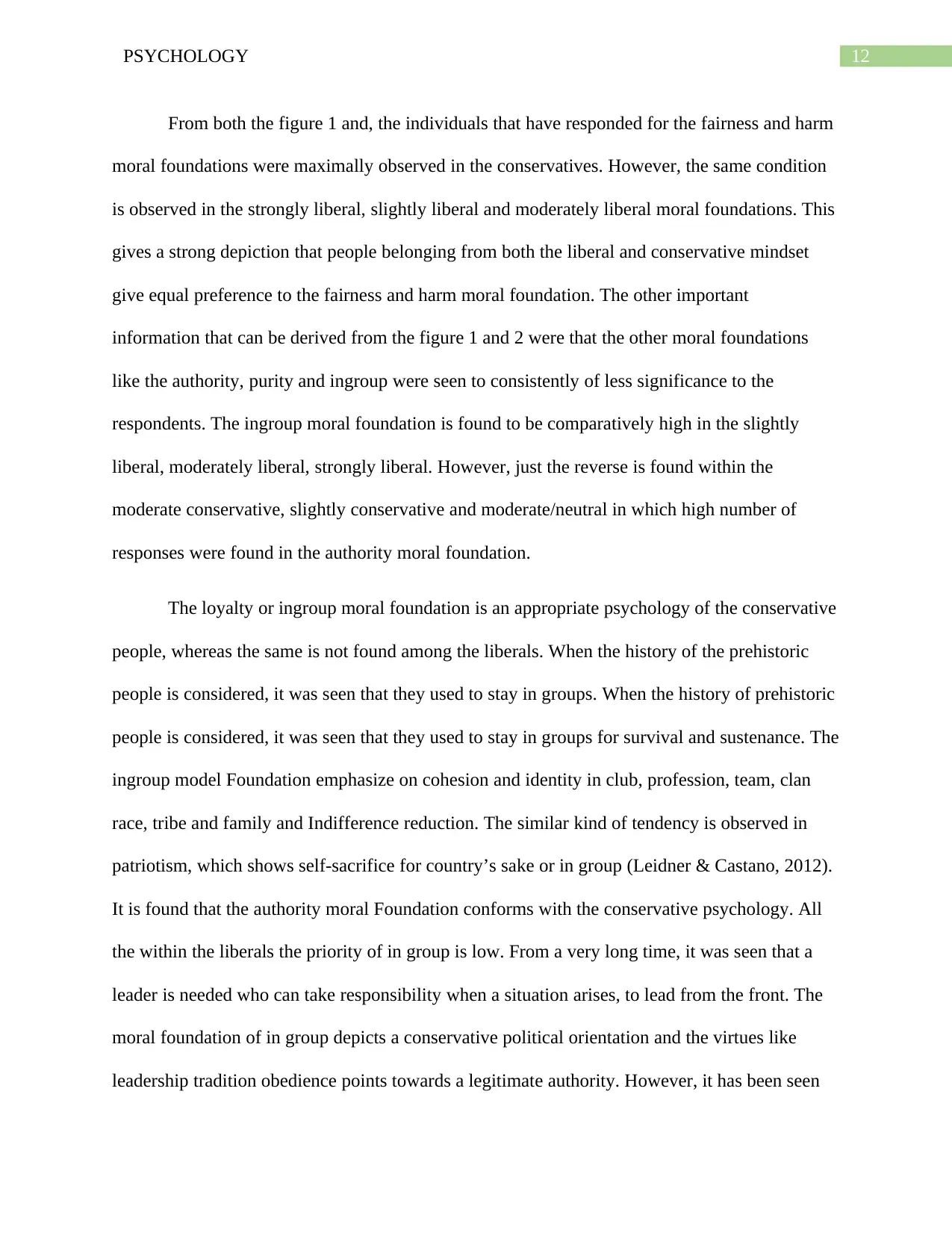
12PSYCHOLOGY
From both the figure 1 and, the individuals that have responded for the fairness and harm
moral foundations were maximally observed in the conservatives. However, the same condition
is observed in the strongly liberal, slightly liberal and moderately liberal moral foundations. This
gives a strong depiction that people belonging from both the liberal and conservative mindset
give equal preference to the fairness and harm moral foundation. The other important
information that can be derived from the figure 1 and 2 were that the other moral foundations
like the authority, purity and ingroup were seen to consistently of less significance to the
respondents. The ingroup moral foundation is found to be comparatively high in the slightly
liberal, moderately liberal, strongly liberal. However, just the reverse is found within the
moderate conservative, slightly conservative and moderate/neutral in which high number of
responses were found in the authority moral foundation.
The loyalty or ingroup moral foundation is an appropriate psychology of the conservative
people, whereas the same is not found among the liberals. When the history of the prehistoric
people is considered, it was seen that they used to stay in groups. When the history of prehistoric
people is considered, it was seen that they used to stay in groups for survival and sustenance. The
ingroup model Foundation emphasize on cohesion and identity in club, profession, team, clan
race, tribe and family and Indifference reduction. The similar kind of tendency is observed in
patriotism, which shows self-sacrifice for country’s sake or in group (Leidner & Castano, 2012).
It is found that the authority moral Foundation conforms with the conservative psychology. All
the within the liberals the priority of in group is low. From a very long time, it was seen that a
leader is needed who can take responsibility when a situation arises, to lead from the front. The
moral foundation of in group depicts a conservative political orientation and the virtues like
leadership tradition obedience points towards a legitimate authority. However, it has been seen
From both the figure 1 and, the individuals that have responded for the fairness and harm
moral foundations were maximally observed in the conservatives. However, the same condition
is observed in the strongly liberal, slightly liberal and moderately liberal moral foundations. This
gives a strong depiction that people belonging from both the liberal and conservative mindset
give equal preference to the fairness and harm moral foundation. The other important
information that can be derived from the figure 1 and 2 were that the other moral foundations
like the authority, purity and ingroup were seen to consistently of less significance to the
respondents. The ingroup moral foundation is found to be comparatively high in the slightly
liberal, moderately liberal, strongly liberal. However, just the reverse is found within the
moderate conservative, slightly conservative and moderate/neutral in which high number of
responses were found in the authority moral foundation.
The loyalty or ingroup moral foundation is an appropriate psychology of the conservative
people, whereas the same is not found among the liberals. When the history of the prehistoric
people is considered, it was seen that they used to stay in groups. When the history of prehistoric
people is considered, it was seen that they used to stay in groups for survival and sustenance. The
ingroup model Foundation emphasize on cohesion and identity in club, profession, team, clan
race, tribe and family and Indifference reduction. The similar kind of tendency is observed in
patriotism, which shows self-sacrifice for country’s sake or in group (Leidner & Castano, 2012).
It is found that the authority moral Foundation conforms with the conservative psychology. All
the within the liberals the priority of in group is low. From a very long time, it was seen that a
leader is needed who can take responsibility when a situation arises, to lead from the front. The
moral foundation of in group depicts a conservative political orientation and the virtues like
leadership tradition obedience points towards a legitimate authority. However, it has been seen
Paraphrase This Document
Need a fresh take? Get an instant paraphrase of this document with our AI Paraphraser
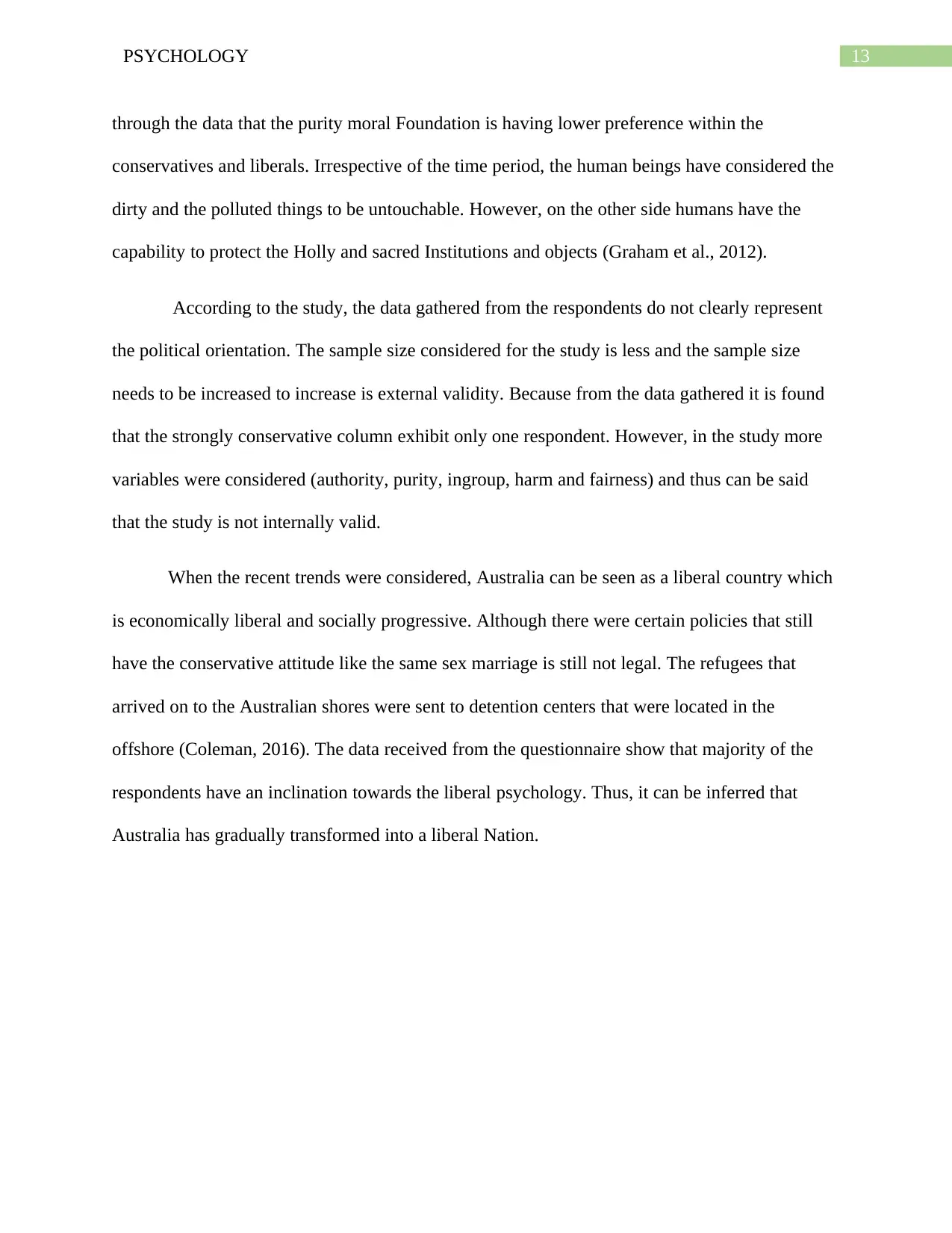
13PSYCHOLOGY
through the data that the purity moral Foundation is having lower preference within the
conservatives and liberals. Irrespective of the time period, the human beings have considered the
dirty and the polluted things to be untouchable. However, on the other side humans have the
capability to protect the Holly and sacred Institutions and objects (Graham et al., 2012).
According to the study, the data gathered from the respondents do not clearly represent
the political orientation. The sample size considered for the study is less and the sample size
needs to be increased to increase is external validity. Because from the data gathered it is found
that the strongly conservative column exhibit only one respondent. However, in the study more
variables were considered (authority, purity, ingroup, harm and fairness) and thus can be said
that the study is not internally valid.
When the recent trends were considered, Australia can be seen as a liberal country which
is economically liberal and socially progressive. Although there were certain policies that still
have the conservative attitude like the same sex marriage is still not legal. The refugees that
arrived on to the Australian shores were sent to detention centers that were located in the
offshore (Coleman, 2016). The data received from the questionnaire show that majority of the
respondents have an inclination towards the liberal psychology. Thus, it can be inferred that
Australia has gradually transformed into a liberal Nation.
through the data that the purity moral Foundation is having lower preference within the
conservatives and liberals. Irrespective of the time period, the human beings have considered the
dirty and the polluted things to be untouchable. However, on the other side humans have the
capability to protect the Holly and sacred Institutions and objects (Graham et al., 2012).
According to the study, the data gathered from the respondents do not clearly represent
the political orientation. The sample size considered for the study is less and the sample size
needs to be increased to increase is external validity. Because from the data gathered it is found
that the strongly conservative column exhibit only one respondent. However, in the study more
variables were considered (authority, purity, ingroup, harm and fairness) and thus can be said
that the study is not internally valid.
When the recent trends were considered, Australia can be seen as a liberal country which
is economically liberal and socially progressive. Although there were certain policies that still
have the conservative attitude like the same sex marriage is still not legal. The refugees that
arrived on to the Australian shores were sent to detention centers that were located in the
offshore (Coleman, 2016). The data received from the questionnaire show that majority of the
respondents have an inclination towards the liberal psychology. Thus, it can be inferred that
Australia has gradually transformed into a liberal Nation.
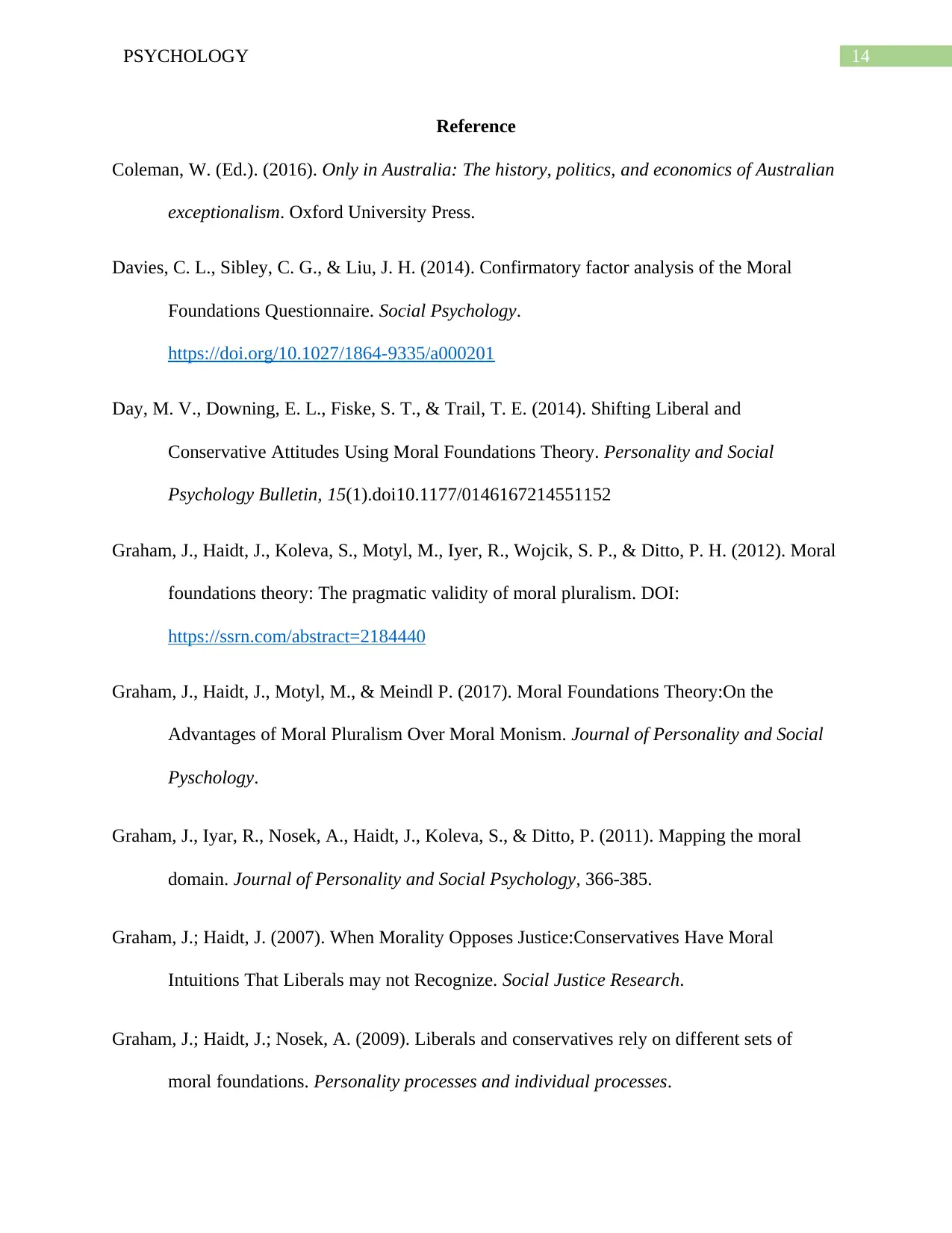
14PSYCHOLOGY
Reference
Coleman, W. (Ed.). (2016). Only in Australia: The history, politics, and economics of Australian
exceptionalism. Oxford University Press.
Davies, C. L., Sibley, C. G., & Liu, J. H. (2014). Confirmatory factor analysis of the Moral
Foundations Questionnaire. Social Psychology.
https://doi.org/10.1027/1864-9335/a000201
Day, M. V., Downing, E. L., Fiske, S. T., & Trail, T. E. (2014). Shifting Liberal and
Conservative Attitudes Using Moral Foundations Theory. Personality and Social
Psychology Bulletin, 15(1).doi10.1177/0146167214551152
Graham, J., Haidt, J., Koleva, S., Motyl, M., Iyer, R., Wojcik, S. P., & Ditto, P. H. (2012). Moral
foundations theory: The pragmatic validity of moral pluralism. DOI:
https://ssrn.com/abstract=2184440
Graham, J., Haidt, J., Motyl, M., & Meindl P. (2017). Moral Foundations Theory:On the
Advantages of Moral Pluralism Over Moral Monism. Journal of Personality and Social
Pyschology.
Graham, J., Iyar, R., Nosek, A., Haidt, J., Koleva, S., & Ditto, P. (2011). Mapping the moral
domain. Journal of Personality and Social Psychology, 366-385.
Graham, J.; Haidt, J. (2007). When Morality Opposes Justice:Conservatives Have Moral
Intuitions That Liberals may not Recognize. Social Justice Research.
Graham, J.; Haidt, J.; Nosek, A. (2009). Liberals and conservatives rely on different sets of
moral foundations. Personality processes and individual processes.
Reference
Coleman, W. (Ed.). (2016). Only in Australia: The history, politics, and economics of Australian
exceptionalism. Oxford University Press.
Davies, C. L., Sibley, C. G., & Liu, J. H. (2014). Confirmatory factor analysis of the Moral
Foundations Questionnaire. Social Psychology.
https://doi.org/10.1027/1864-9335/a000201
Day, M. V., Downing, E. L., Fiske, S. T., & Trail, T. E. (2014). Shifting Liberal and
Conservative Attitudes Using Moral Foundations Theory. Personality and Social
Psychology Bulletin, 15(1).doi10.1177/0146167214551152
Graham, J., Haidt, J., Koleva, S., Motyl, M., Iyer, R., Wojcik, S. P., & Ditto, P. H. (2012). Moral
foundations theory: The pragmatic validity of moral pluralism. DOI:
https://ssrn.com/abstract=2184440
Graham, J., Haidt, J., Motyl, M., & Meindl P. (2017). Moral Foundations Theory:On the
Advantages of Moral Pluralism Over Moral Monism. Journal of Personality and Social
Pyschology.
Graham, J., Iyar, R., Nosek, A., Haidt, J., Koleva, S., & Ditto, P. (2011). Mapping the moral
domain. Journal of Personality and Social Psychology, 366-385.
Graham, J.; Haidt, J. (2007). When Morality Opposes Justice:Conservatives Have Moral
Intuitions That Liberals may not Recognize. Social Justice Research.
Graham, J.; Haidt, J.; Nosek, A. (2009). Liberals and conservatives rely on different sets of
moral foundations. Personality processes and individual processes.
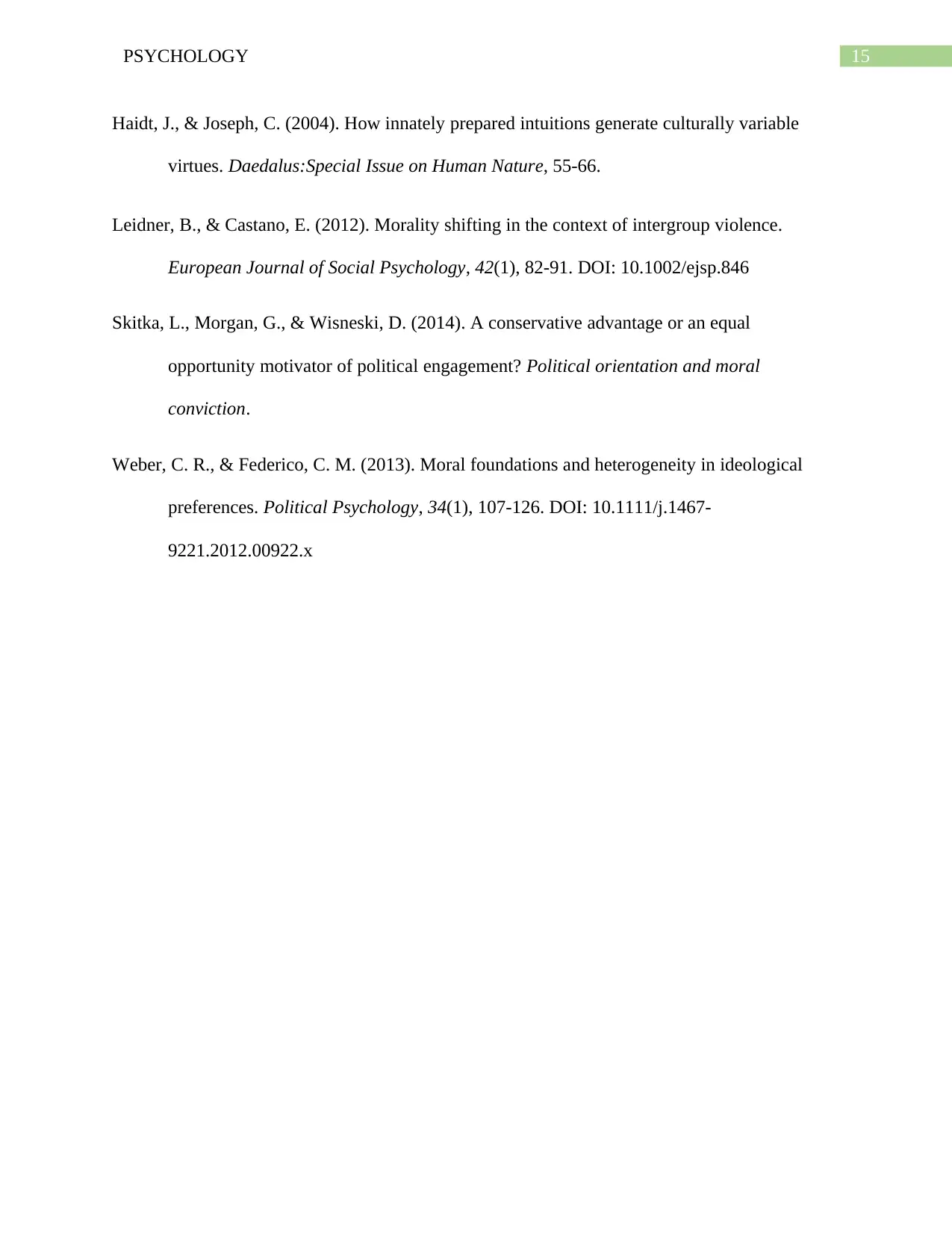
15PSYCHOLOGY
Haidt, J., & Joseph, C. (2004). How innately prepared intuitions generate culturally variable
virtues. Daedalus:Special Issue on Human Nature, 55-66.
Leidner, B., & Castano, E. (2012). Morality shifting in the context of intergroup violence.
European Journal of Social Psychology, 42(1), 82-91. DOI: 10.1002/ejsp.846
Skitka, L., Morgan, G., & Wisneski, D. (2014). A conservative advantage or an equal
opportunity motivator of political engagement? Political orientation and moral
conviction.
Weber, C. R., & Federico, C. M. (2013). Moral foundations and heterogeneity in ideological
preferences. Political Psychology, 34(1), 107-126. DOI: 10.1111/j.1467-
9221.2012.00922.x
Haidt, J., & Joseph, C. (2004). How innately prepared intuitions generate culturally variable
virtues. Daedalus:Special Issue on Human Nature, 55-66.
Leidner, B., & Castano, E. (2012). Morality shifting in the context of intergroup violence.
European Journal of Social Psychology, 42(1), 82-91. DOI: 10.1002/ejsp.846
Skitka, L., Morgan, G., & Wisneski, D. (2014). A conservative advantage or an equal
opportunity motivator of political engagement? Political orientation and moral
conviction.
Weber, C. R., & Federico, C. M. (2013). Moral foundations and heterogeneity in ideological
preferences. Political Psychology, 34(1), 107-126. DOI: 10.1111/j.1467-
9221.2012.00922.x
1 out of 16
Related Documents
Your All-in-One AI-Powered Toolkit for Academic Success.
+13062052269
info@desklib.com
Available 24*7 on WhatsApp / Email
![[object Object]](/_next/static/media/star-bottom.7253800d.svg)
Unlock your academic potential
© 2024 | Zucol Services PVT LTD | All rights reserved.





